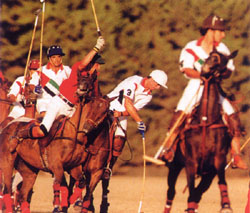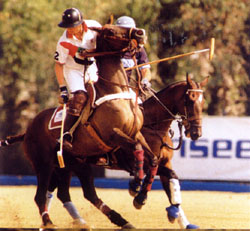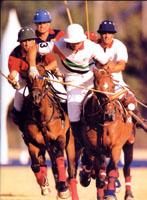People have been playing polo in the UAE since the Dubai Polo Club was established 24 years ago. But it is only in recent years that the oldest and some say, most prestigious game in the world has really taken off here.
 Originally conceived as a military game to keep cavalry in shape during peace time, it is not for the faint hearted. The game has been played in the form of a miniature battle with as many as 100 players on each side.
Originally conceived as a military game to keep cavalry in shape during peace time, it is not for the faint hearted. The game has been played in the form of a miniature battle with as many as 100 players on each side.
A game of skill, dexterity and fearlessness, it was first played in Persia about 6th century BC. It's like playing incredibly high speed chess. Players need to be able to hit an object the size of a cricket ball with a thin mallet four feet long whilst sitting on a horse galloping at more than 40 miles an hour. It is rumoured that warriors playing an early form of the game in in Shandur, near Peshawar have been known to use the heads of their enemies as balls after fierce battles.
Polo was introduced into India by Muslim conquerors in the 13th century. Modern polo developed during the days of the Raj when Britsih army personnel brought it back to England where it was first played in 1862.
|
Playing the game
Modern polo is played on a ground 300 yards long and 200 yards wide. Each game is divided into chukkas which last up to seven and a half minutes. It is played between two teams who battle for a designated number of chukkas. The number of chukkas per game varies between four and eight.
There are four players on each team. Each player is given a handicap by a committee in his club and depending on the country this ranges from - 4 to 10. At the time of writing, 12 players (nine Argentineans) in the world reached 10 goals. The addition of the handicaps of the teams players gives the handicap of the team which determines the level of tournament the team can enter.
England sees games of up to 33 goals but open polo in the USA sees scores of up to 36 or 37. In Argentina it can reach up to 40, the maximum for any team.
|
By the end of the 19th century, polo became popular in USA . From there its popularity spread to the Middle East and South America and in particular Argentina which is the undisputed master of polo and where polo is the national sport .
It hasn't quite reached that level here. But players say that polo has the potential to rival racing as the UAE's sporting obsession.
Polo may still be in its early stages, but Alejandro Olmos, the only Argentinan polo player based permanently in UAE says that it is becoming more organised. "It takes time to develop a game like this,' he says. "Every day I'm surprised by the new projects that are developing. Polo has become very well established here now. The UAE is now on the international polo map, which in a short space of time is remarkable.'
A well built man with dark curly hair that has just a trace of grey, Olmos says that his family has been breeding horses for 50 years and he has been playing polo for as long as he can remember. He grew up on a ranch near Buenos Aires where he still breeds polo ponies.
Olmos, a semi-professional player and a breeder who has coached the British Royal Navy team, first came to the UAE in 1992. "I came here for one year to coach and play,' he says in lilting English. "And I am still here.'
Olmos is one of the men responsible for implementing means to regulate the sport in the UAE and bring it into line with international polo standards. He says that the Emirates Polo Association is under formation at the moment. Once this is established, he says that "it will give local polo a national and international identity and will make everything official.' UAE polo will finally be included amongst the world's polo playing nations.
 Olmos says that polo in his native Argentina has become very competitive on a professional level and more cut-throat than it used to be in 'the good old days.' UAE polo reminds him to a certain extent of those days in Argentina. "The first time I came here I felt welcome. The weather is good, the locations are great. I like the energy of the sport here. It's really got a lot of potential.'
Olmos says that polo in his native Argentina has become very competitive on a professional level and more cut-throat than it used to be in 'the good old days.' UAE polo reminds him to a certain extent of those days in Argentina. "The first time I came here I felt welcome. The weather is good, the locations are great. I like the energy of the sport here. It's really got a lot of potential.'
The sturdy Argentinean says that what has really sealed the success of polo in the UAE is local support for the game. "Before it was mainly expats who played the game, but today with the support of many local polo enthusiasts, polo has been given a new image ... It's going to get better because people are starting to play at a younger age. Fathers will encourage their sons to play and this means that the future of the sport is secured.'
It also has a longer season than anywhere else. "Five months is the average for a season,' says Olmos. But we have a season that goes from October to May, eight months. The way I see this developing is that we'll have one or two months of really high quality competitions that will attract high ball players and the rest of the season will be more low key.'
Olmos admits that the quality of polo here cannot be compared to countries like Argentina, Britain or USA where polo has a long and respected tradition. "Professionals will come here for a short time and they'll be attracted by the weather, the proximity to the sea and Dubai, but the really dedicated players will not stay here forever. They always want to improve and to do that they need a certain standard which they do not have here yet.'
That doesn't mean that there are no high quality players in the UAE. International teams play tournaments here and local teams play abroad. Olmos says that there are plans to hold world class tournaments here. "People are very impressed by what they see here.'
Sponsorship is also playing a large role in the development of the sport. Olmos says that clubs here do offer incentives to players and are determined to encourage young players - who are vital to the success of the game here.
But what is propelling the sport into the international arena is money. Olmos says that the future of polo here depends on the ability to keep money flowing into the sport. "Polo is not a cheap sport,' says Olmos. "People here are aiming higher and higher. They want to bring a lot of good professionals here to increase the standard of the game.And this place has what it takes financially. UAE has more potential than any other Arab country to successfully develop this sport because it has the economic means to do it.'
Christopher Wroe, director of Polo at the plush Ghantoot Racing and Polo Club that covers 1500 acres of land on the borders of Abu Dhabi and Dubai agrees that money has played a large part in the rapid development of the game here.
A blonde haired Englishman who looks every inch the gentleman, he played professional polo in Britain. After leaving university, he stopped over in Dubai on his way to Australia but decided to stay because of what he saw here. "It was a breath of fresh air. I saw it as an opportunity to develop a sport from scratch in a culture where it was very new.'
Ghantoot is the biggest and most prestigious polo club here. It is reputed to have cost millions to build. It started life as a racing track and later expanded to incorporate polo.Decorated in colonial style, the clubhouse pays tribute to the colonial origins of polo whilst looking towards the future.
 Wroe remembers the club in its early days three years ago when there were only 50 ponies (there are now more than 200). He says that the rate at which polo has developed here is incredible. "What's been achieved here would take much longer elsewhere.'
Wroe remembers the club in its early days three years ago when there were only 50 ponies (there are now more than 200). He says that the rate at which polo has developed here is incredible. "What's been achieved here would take much longer elsewhere.'
Wroe links the development to the rapid growth of the Emirates as a booming business centre. Polo players tend to be wealthy, he says. "You find that many polo players are also business men. People who do business and who play polo will find a reason to come here,' he pauses. "And well, everyone wants to come here.'
There is no doubt that polo is a game for the rich, famous and aristocratic. Michelle Namaan, the PR representative at Ghantoot says that Ghantoot games are " strictly by invite only. People don't pay. It's an honour to be invited.' Britrain's Prince Charles, polo's very public aristocratic face has visited Ghantoot.
But she admits that membership to the club is open for all. It just depends whether it can be afforded. Naaman says that polo will never be as elite here as it is in Britain for example. But she insists that there are certain standards that have to be met.
Mohamed Akthar Kan, the manager of the Dubai Polo Club and the son of a polo playing and horse breeding father admits that it is very difficult to play polo cheaply.
Polo is "really one of the most expensive games on earth, " he says. Player must have six horses, grooms and a trainer. He estimates it cost about pounds 100,000 per season for high goal players. Horses are expensive "anything from $30,000 to 150,000,' he says. "And one hit can take a horse out.'
But he doesn't think that the game should be a sport for the privileged. He started to play polo at the age of nine in Pakistan and has a four goal handicap. He had a five year professional career playing polo in countries all over the world.
He is responsible for converting a row of stables near the Nad Al Shiba racing track into stables into a fully operational polo club. He is one of the original pioneers of polo in this country.
He says that the Dubai Polo Club aims to allow anyone to play polo. "It is not elite,' says the 40 year-old. clad in jodhpurs as he sits in the deep, well worn leather chairs of the clubhouse. "There is no class system here the way there is England where the sport is seen as something for the upper classes.' Khan has played polo with Prince Charles, but says that playing polo here is "more normal than it is in other places. I'm not a rich man,' he smiles. "But I play.'
The Dubai Polo Club is in a different league to the Ghantoot. The playing fields are sandy (although a second sandy pitch is planned) and the club house much more modest than Ghantoot. But this is where polo in the UAE had its origins. "We started with 17 horses. Now we have 185 players and 250 horses. In those days most players were foreigners. I knew that we needed more local people to play and today we can see that happening.'
Khan says that polo appeals to people here because there of a long equestrian tradition in the Emirates. He also says that people here don't mind taking a few risks. "It's a very dangerous game,' says Khan. "People can die.' He says that a good player "must of course be able to ride well, be brave, easy in the saddle and laid back.'
"Its a game for leaders he adds. "You need outstanding reactions. It's a game that requires a lot of thought, a lot of intelligence and anticipation. People are very good at here."
As one of the country's most experienced players, Khan considers the future. "It's a new country and this is a new game for it. But its starting to gain respect. People know we play polo. That's good.